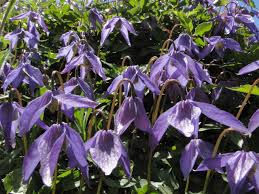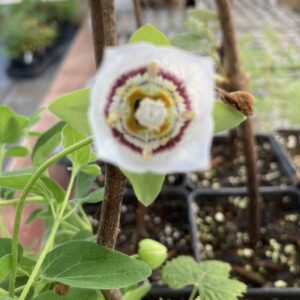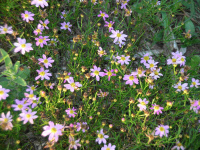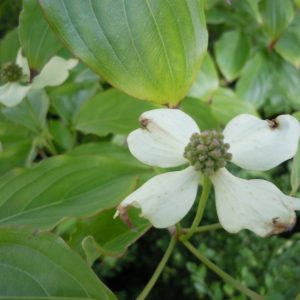Archives
Showing 49–56 of 199 results
-
Chrysanthemum parthenium syn. Tanacetum parthenium Feverfew Z 5-9
Cheerful, small white daisies flower all summer and autumn
ARCHIVED
Note: This is a plant not currently for sale. This is an archive page preserved for informational use.
Cheerful, small white daisies flower all summer and autumn.
Size: 18-24” x 12”
Care: Full sun moist well-drained soil
Native: Europe and CaucasusCommon name “Feverfew” speaks for itself, referring to the plant’s medicinal qualities. The species’ name parthenium comes from Plutarch who claimed that the plant saved the life of a construction worker who fell from the Parthenon. Feverfew was prescribed to remedy coughs, indigestion, congestion, melancholy, hysteria, vertigo, freckles, opium overdoses and for “them that are giddie in the head.” Parkinson. A favorite early cottage garden flower. Pressed specimen in Emily Dickinson’s herbarium.
-
Chrysanthemum serotinum syn. Leucanthemella serotina Autumn oxeye, Giant daisy Z 4-8
Pure white daisies with golden centers, 2-3” across, aren’t just for summer. This one celebrates the fall.
ARCHIVED
Note: This is a plant not currently for sale. This is an archive page preserved for informational use.
Pure white daisies with golden centers, 2-3” across, aren’t just for summer. This one celebrates the fall.
Size: 4-7’ x 12-24”
Care: sun in moist to moist well-drained soil
Native: SE Europe & Balkans
Wildlife Value: Attracts bees, butterflies and hummingbirds
Awards: Royal Horticultural Society Award of Garden MeritDescribed by Linnaeus 1753. The Gardeners Dictionary (1783): “This grows naturally in North America but hath long been preserved in English gardens. …each(stalk) being terminated by a large, white, radiated flower; these appear in September. It multiplies very fast by its creeping roots.”
-
Clematis columbiana v. tenuiloba syn. C. alpina v. occidentalis sub. var. tenuiloba Rock clematis Z 3-8
Deep violet elongated bells in early summer on short erect stems, only 6” high
ARCHIVED
Note: This is a plant not currently for sale. This is an archive page preserved for informational use.
Deep violet elongated bells in early summer on short erect stems, only 6” high
Size: 6" x 12"
Care: sun to part shade in moist well-drained soil
Native: Rocky Mountains & the Dakotas1st described in 1881 by Harvard botanist Asa Gray
-
Clematis recta ‘Purpurea’ Ground clematis, Flammula clematis POISONOUS Z 3-9
Fragrant star-shaped white blooms May-July on attractive purple foliage, fading to green by mid-summer.
ARCHIVED
Note: This is a plant not currently for sale. This is an archive page preserved for informational use.
Fragrant star-shaped white blooms May-July on attractive purple foliage, fading to green by mid-summer. Can be trained to climb or left as a groundcover. Handling plant may cause contact dermatitis or allergic reaction
Size: 3-5' x 2-4'
Care: sun to part shade with moist well-drained soil. Pinch back buds to maintain purple foliage longer-when plant blooms foliage fades to green.
Native: Eastern, southern and central Europe.
Wildlife Value: attracts hummingbirds, butterflies & bees; Deer and Black Walnut tolerantRecommended for its purple foliage in The Gardens of Gertrude Jekyll.
-
Codonopsis ovata syn. Glosocomia ovata syn. Wahlenbergia roylei Kashmir Bellflower, Bonnet Bellflower Z 3-7
Large, single, pendulous, milky-blue bell-shaped flowers flared at the tips. Blooms July-August.
ARCHIVED
Note: This is a plant not currently for sale. This is an archive page preserved for informational use.
Large, single, pendulous, milky-blue bell-shaped flowers flared at the tips. Blooms July-August.
Size: 15” x 15”
Care: sun to part shade in moist well-drained soil
Native: Himalayas, from Pakistan to Kashmir
Wildlife Value: attracts Bees
Size: Root is edible (but not tasty) when cooked. It can also be dried and ground into a powder. A famine food, used when all else fails. The roots and leaves have been used in its native areas to make a poultice for the treatment of bruises, ulcers and wounds. Medicinal use published 1895.Collected before 1835.
-
Coreopsis rosea Pink tickseed Z 4-8
Dainty (appearing but actually tough) pink daisies with yellow centers from summer through autumn, very long blooming. Wonderful for rock gardens, groundcover or front of border.
ARCHIVED
Note: This is a plant not currently for sale. This is an archive page preserved for informational use.
Dainty (appearing but actually tough) pink daisies with yellow centers from summer through autumn, very long blooming. Wonderful for rock gardens, groundcover or front of border.
Size: 12” x 12” spreading
Care: full sun in well-drained soil. Slow to emerge in spring.
Native: Eastern No. AmericaCoreopsis is Greek meaning “buglike” referring to the seeds looking like little black bugs. Thomas Nuttall 1st collected this flower in 1815 about 20 miles NW of Savannah along the river. He described its native habitat: “in open grassy swamps from New Jersey to Georgia…” William Robinson, father of the mixed perennial border called this “a neat and pretty plant.” In 1913 Sanders wrote that it “make(s) a brilliant display of color (when) grown in masses in sunny borders.”
-
Cornus kousa Kousa dogwood Z 5-8
Audacious, snow white 4” bracts for 4-6 weeks in June & July cover shrub’s horizontal branches, followed by crimson fruit in late summer & scarlet foliage in fall.
ARCHIVED
Note: This is a plant not currently for sale. This is an archive page preserved for informational use.
Audacious, snow white 4” bracts for 4-6 weeks in June & July cover shrub’s horizontal branches, followed by crimson fruit in late summer & scarlet foliage in fall.
Considered an invasive/illegal species in Maryland
Size: 15’ x 15’
Care: sun to part shade in well-drained soil Prune: little required, done in late winter
Native: Asia
Awards: Cary Award Distinctive Plants for New EnglandCalled Yamaboushi in its native Japan. In 1861 George Rogers Hall, residing in Yokohama, sent the 1st Cornus kousa seed to America from Japan. Francis Parkman sowed the seeds in his garden in Jamaica Plain MA garden. By the 1890’s 2 nurseries sold it in the U.S. – Parsons & Sons Co. and Yokohama Nursery. “Chinese” Wilson introduced the variety var. chinensis from Hupei Province in central China in 1907.
-
Corylus americana American Hazelnut, Filbert Z 4-9
In spring, showy male flowers on 2-3" long catkins. Female flowers appear in small, reddish catkins grow into half inch long, egg-shaped edible nuts. Fall color ranges from orange, rose, purplish red, yellow and green.
ARCHIVED
Note: This is a plant not currently for sale. This is an archive page preserved for informational use.
In spring, showy male flowers on 2-3″ long catkins. Female flowers appear in small, reddish catkins grow into half inch long, egg-shaped edible nuts. Fall color ranges from orange, rose, purplish red, yellow and green.
Size: 10-16’ x 8-1’
Care: sun in any soil
Native: E. North America including Wisconsin
Wildlife Value: Exceptionally high value to wildlife. Pheasant, Quail, Turkey, Grouse, Turkey & Blue Jay and small animals eat the nuts. Pollen source for bees, host to many caterpillars both butterflies and moths. Branches make good nesting sites for songbirds. Black walnut tolerant.Described by Thomas Walter in 1788. Food for several Native American tribes. Medicinal for Cherokee, Iroquois, Menominee, Meskwaki and Ojibwa, to remedy hives, fever, headaches, pain of baby’s teething, hay fever and induce vomiting.
**LISTED AS OUT OF STOCK BECAUSE WE DO NOT SHIP THIS ITEM. IT IS AVAILABLE FOR PURCHASE AT OUR RETAIL LOCATION.






